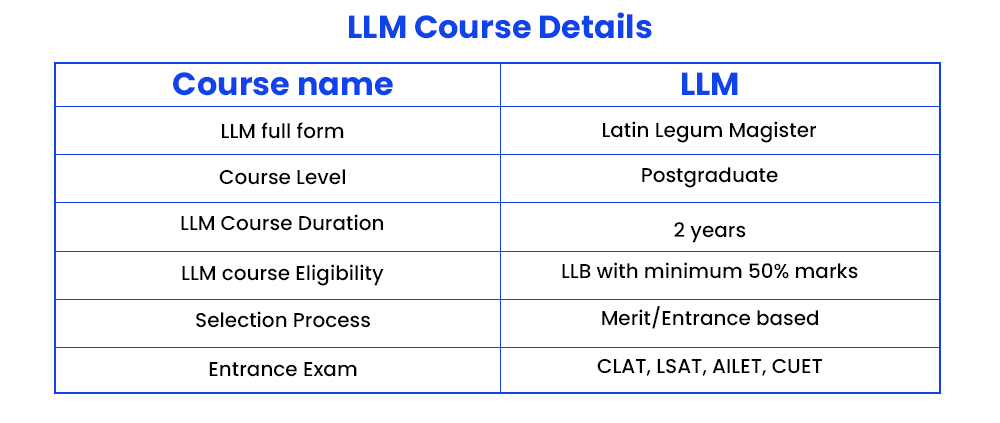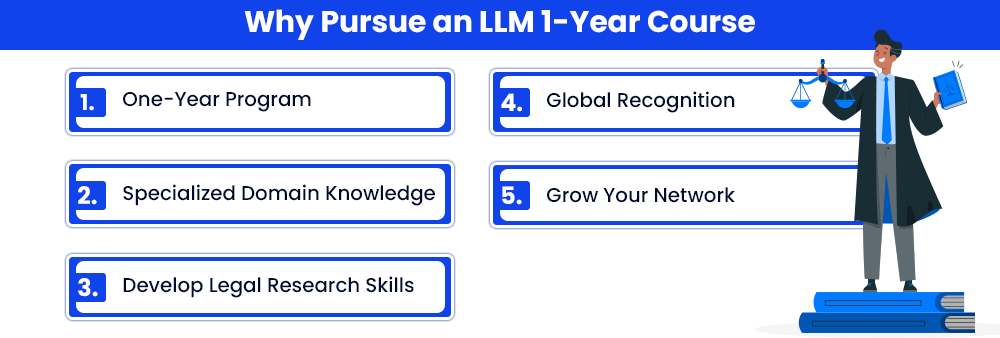LLM Course Duration: What You Need to Know

Table Of Content
- Significance of the LLM Programme
- LLM Degree Duration in India
- Difference Between LLM 1-Year and 2-Year Programs
- Factors Affecting LLM Duration
Significance of the LLM Programme

In recent years, the LLM (Master of Laws) has become an increasingly common postgraduate qualification for those who have completed a law program and are seeking to enhance their competitiveness in the legal marketplace.
While pursuing an LLM, you have to start from the ground up by first completing your LLB degree from a qualified law institution. The LLM will mainly take you one year to complete and is an opportunity to develop specific expertise in areas such as corporate and financial law, criminal law, commercial dispute resolution, and others. Developing specific expertise helps you identify a discipline of interest and establish a solid knowledge foundation to build upon as a lawyer, regardless of the type of law you practice.
For example, many institutions offer an advanced learning experience with engaged learning methods – case studies, group processes, visuals, and expert dissertation support. Additionally, students are exposed to legal research based on real-world legal outcomes, including corporate scandals. The course is more engaging and interesting, and it encourages students to think critically.
LLM Degree Duration in India
Difference Between LLM 1-Year and 2-Year Programs
Factors Affecting LLM Duration
Besides the given standard LLM course duration, there are several other factors that influence the time to complete your LLM:
- Study Pattern: The programme may last 1–2 years for full-time study, or it may last 2–3 years for part-time or distance study.
- Country of Study: The LLM Course duration varies across different countries. For example, it is 1 year in the UK and Australia, but is typically 2 years in Germany and Canada.
- Specialisation: Some different areas of law (e.g. International Law or Taxation Law) are likely to have longer modules that are more detailed.
- University Specific Requirements: There are different universities that have differing coursework, dissertation requirements and internships; all of which can impact the LLM duration in india and other countries as well.
- Mode of Learning: Blended and online can offer flexibility; however, they should generally provide you with longer course completion than conventional classroom-based course delivery.
- Student Background: Non-law graduates (in some countries) need to complete introductory law modules, which can increase the time frame.
Conclusion
Before committing to this career path, it is essential to understand the duration of the LLM course. Regardless of the nature of the LLM qualifications which are available, an LLM better qualifies you to advance your capabilities and employability, and allows you to view your degree as a platform for seeking future domestic and international legal careers. The law profession is witnessing increasing demand for highly skilled professionals who can apply advanced knowledge to address quickly evolving legal and business contexts. However, the legal profession is evolving, and professionals must advance their careers to align with future expectations. This is where Jaro Education comes in. Jaro collaborates with leading institutes to offer online degree courses and certification programs in the fields of law, business, and technology. Visit our website to explore the courses and academic support that we offer.
Frequently Asked Questions
In India, the LLM degree duration is either 1 year or 2 years, depending on the university and specialisation. The Bar Council of India (BCI) has approved the 2-year format from the 2022–23 academic session, while many private and international universities continue to offer the 1-year option.
Yes, the 1-year LLM is widely recognised in countries such as the UK, Australia, and Singapore.
The LLM salary primarily depends on specialisation, experience, and location, rather than just course duration. However, the 2-year LLM course duration often provides better opportunities for research, judiciary roles, and academia, while the 1-year LLM course duration is ideal for corporate law and international practice.
Find a Program made just for YOU
We'll help you find the right fit for your solution. Let's get you connected with the perfect solution.

Is Your Upskilling Effort worth it?

Are Your Skills Meeting Job Demands?

Experience Lifelong Learning and Connect with Like-minded Professionals


